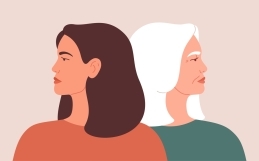
“The victim mindset dilutes the human potential. By not accepting personal responsibility for our circumstances, we greatly reduce our power to change them.”
–Steve Maraboli
It feels like that moment right before a storm, when the clouds start getting darker and move across the sky, forming a thick wall that blocks all the sunlight. Before you know it, the whole sky is dark, the birds have stopped chirping, and the radiant warmth of the sun can no longer be felt on your cheeks. That’s how it feels when an angry, resentful, self-proclaimed “victim” walks into a room—like a dark cloud covering all the beauty that once existed.
As a former self-identified “savior,” it’s easy for me to feel the resentment, negativity, and pain that victims carry. Some people walk around with an open invitation for someone, anyone, to save them and make them feel better. In my savior days, it felt like I was always getting a VIP invite that felt impossible to decline. Victims walk around with a dark cloud over them, hoping someone else will perform the rain dance that will change the weather, part the dark clouds, and bring the sunlight. I once used to respond to the victim’s request with an eager, “Oooh oooh, pick me! Pick me!”
What victims are looking for is a “savior” who will make them feel better—a dark knight in shining armor, a saint, a real mensch. But just like with a storm, no one has control over how another person feels about their life—not even the saviors. No matter how many rain dances, prayers, or “rain, rain go away” songs are performed, nothing can make the storms go away forever. When I was a savior I refused to believe this. I insisted in trying to rescue and take responsibility; I never stopped trying. You see, victims and saviors go together like Bonnie and Clyde, peanut butter and jelly, yin and yang, spaghetti and meatballs. They feed off each other; they need each other to feel complete.
Taking Responsibility for What Isn’t Yours
My intention here is not to just throw around labels like “victim” or “savior.” I’m using this language for a particular reason: to show a pattern of behavior that sometimes develops between people when essential limits aren’t put in place. Let me explain. In relationships, limits and boundaries are necessary so that each person takes responsibility for his or her own problems. People who maintain a strong sense of self in what they would call fulfilling relationships, such as those with family members, friends, or partners are clear about their own values. They take ownership over those values and take responsibility for their part in any problems that may arise from their values being disrespected. They do not, however, take responsibility for their friends’, family members’, or partners’ values and problems.
People in what you may call toxic, unhealthy, not so fulfilling relationships have no limits and don’t take responsibility for their own values, boundaries, or problems. In other words, they try to pawn them off to the person who loves them and would do anything to see them happy. They saddle up with people who take responsibility for emotions, values, and problems that are not their own. We may call the people who take this on saviors, people-pleasers, or approval seekers—at least that’s what I used to call myself. We may call the people who pawn off their issues victims and use words like selfish or dramatic to describe them.
Both victims and saviors live emotionally intertwined lives. They are enmeshed in their relationships. What I mean by this is that they jump into the trap of placing their happiness in others’ hands take on too much responsibility for other people’s problems. In both cases, this results in a failure to accept responsibility for their own problems. Both victims and saviors avoid creating a strong sense of self and fail to develop a sense of emotional maturity apart from their relationships. This may result in their relationships feeling insincere, shallow, and unfulfilling instead of rewarding or fulfilling, as a true partnership based on genuine love, appreciation, and acceptance can feel.
The savior-victim dynamic appears in all types of relationships, not just those among spouses or partners. For example, so-called “helicopter parents” may take too much responsibility for the problems in their children’s lives. This may lead their children to believe that other people should always be responsible for their problems as they go through life. Why wouldn’t they think that? When you always have people taking care of you and meeting all your needs, it’s very difficult to develop your own limits, values, or sense of self.
Choice Versus Obligation
Meaningful connections and loving relationships are forged through mutual support by both parties. It’s possible that some people blame others for their emotions and actions because they think that if they show how much they’re suffering, someone will eventually save them; then they’ll have the love they’ve always desired. The saviors who answer this call do so because they truly think that fixing the person’s problems or resolving their suffering will finally win them the love and admiration they’ve always desired. Do you see why these types of people fit so well together? They both want the same result but go about it in different ways. Eventually they end up failing to meet each other’s expectations, leading to a blame game that crushes both parties’ sense of self-worth—the self-worth that they should be giving themselves in the first place. As long as they keep seeking it in another, they’ll never really get their needs met.
In any relationship, it’s helpful for both people to take responsibility for themselves and say things like this to their love ones: “This is my problem; you don’t have to fix it for me. Just support me while I figure it out myself.” Statements like that express self-love as well as love for the other person. To break out of my savior complex, I had to learn to say things like, “I am here for you, but you have to take care of that yourself. I will not do it for you.” Helping people help themselves is more effective than doing it for them.
Awareness of Self
Building strong boundaries is about having awareness of self. This means being mindful of your values, worth, and limits. In the victim and savior relationship, neither person is functioning for self. Instead, each person is more concerned about the other person than about himself/herself or the health of the relationship. If you’re defined by your relationship, you’re more aware of the other person, altering your own behavior out of fear of the other person’s reactions. This creates anxiety for everyone involved. Functioning without self-awareness means making decisions based on your feelings rather than your reasoned thoughts. The dynamics of the victim-savior relationship change when one or both people stop putting energy into changing the other and start focusing on their personal growth instead.
When we’re in highly anxious relationships we tend to become either consumed by our relationships or neglectful of them. Instead of opting for either of those choices, try to focus on managing yourself. Becoming clearer about how to manage your thoughts, emotions, and behaviors in the context of your relationship will reduce any symptoms that may have manifested from the stress and anxiety within that relationship. Pay attention to your relationships, seeing the part you play in them—not to judge yourself, but to become accountable for your contribution. You’ll benefit greatly from doing this, and you’ll give your relationships a chance to flourish without. Over time, you’ll no longer depend on anyone else for a sense of your worth. You’ll be more aware of your actions and have a clearer sense of how you’d like to act in future situations. You won’t need rescuing, and you won’t need to rescue anybody else either.
Talk soon,
Dr. Ilene
Article edited by Dr. Denise Fournier





